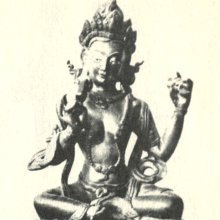Upayakaushalya, Upāyakauśalya, Upaya-kaushalya: 4 definitions
Introduction:
Upayakaushalya means something in Buddhism, Pali, Hinduism, Sanskrit. If you want to know the exact meaning, history, etymology or English translation of this term then check out the descriptions on this page. Add your comment or reference to a book if you want to contribute to this summary article.
The Sanskrit term Upāyakauśalya can be transliterated into English as Upayakausalya or Upayakaushalya, using the IAST transliteration scheme (?).
Images (photo gallery)
In Buddhism
Mahayana (major branch of Buddhism)
Source: Wisdom Library: Maha Prajnaparamita SastraUpāyakauśalya (उपायकौशल्य) or Upāyakauśala refers to “skillful means”, according to Mahāprajñāpāramitāśāstra (chapter 49).—Accordingly, “[...] [In regard to the perfection of generosity], this skillful means [i.e., upāyakauśalya] is not to grasp (anupalambha) three things: [the donor (dāyaka), the thing given (deya) and the recipient (pratigrāhaka)]. [...] Not grasping that which does exist is to fall into the view of nihilism (uccheda). Not grasping that which does not exist is to put skillful means (upāyakauśala) to work and not falling into the view of nihilism. Without skillful means, the donor, [in his gift], clings to these three characteristics, [i.e., the giver, the gift and the receiver]. But if he has recourse in the emptiness of these three things, he grasps the absence of characteristics. He who possesses skillful means from the very beginning does not see the three characteristics of generosity. This is why using skillful means (upāyakauśala) is not to fall [into the extreme views] of existence and non-existence”.
Note: Upāyakauśalya is the dominant virtue of the seventh bhūmi.—(Cf. Upāyajñāna).
Source: academia.edu: A Study and Translation of the GaganagañjaparipṛcchāUpāyakauśalya (उपायकौशल्य) refers to “skillful means”, according to the Gaganagañjaparipṛcchā: the eighth chapter of the Mahāsaṃnipāta (a collection of Mahāyāna Buddhist Sūtras).—Accordingly, “[...] Then, the bodhisatva, the great being, Gaganagañja addressed himself to the Lord: [...] (23) [How are Bodhisattvas] skilled in knowing the entrance into the dependent origination, and free from all views of two extremes? (24) [How do the Bodhisattvas see] the suchness without any differentiation between knowledge (jñāna) and skillful means (upāyakauśalya) as sealed with the seal of the Tathāgata? [...]’”.

Mahayana (महायान, mahāyāna) is a major branch of Buddhism focusing on the path of a Bodhisattva (spiritual aspirants/ enlightened beings). Extant literature is vast and primarely composed in the Sanskrit language. There are many sūtras of which some of the earliest are the various Prajñāpāramitā sūtras.
Languages of India and abroad
Sanskrit dictionary
Source: Cologne Digital Sanskrit Dictionaries: Edgerton Buddhist Hybrid Sanskrit DictionaryUpāyakauśalya (उपायकौशल्य).—nt. (= Pali °kosalla), (1) skill in expedients, ‘able management, diplomacy’ (Kern, [Sacred Books of the East] 21.30 note 1); compare prec., which however is very rare, whereas this is extremely common everywhere, especially of the Buddha's skill in devising means to impress and convert people: Saddharmapuṇḍarīka 33.8 (also name of Saddharmapuṇḍarīka Chap. 2) etc.; Gaṇḍavyūha 248.11 (mahop°), et passim. In Bodhisattvabhūmi 261.6 text prints °kauśalam, but v.l. °lyam should doubtless be adopted. Mahāvyutpatti 795; and as (2) name of a Buddhist work 1345; in the latter sense °lya-sūtra Śikṣāsamuccaya 66.9; 165.5; 167.3; 168.4, 12.
Source: Cologne Digital Sanskrit Dictionaries: Monier-Williams Sanskrit-English DictionaryUpāyakauśalya (उपायकौशल्य):—[=upāya-kauśalya] [from upāya > upe] n. skill in the choice of means, [Saddharma-puṇḍarīka]
Sanskrit, also spelled संस्कृतम् (saṃskṛtam), is an ancient language of India commonly seen as the grandmother of the Indo-European language family (even English!). Closely allied with Prakrit and Pali, Sanskrit is more exhaustive in both grammar and terms and has the most extensive collection of literature in the world, greatly surpassing its sister-languages Greek and Latin.
See also (Relevant definitions)
Partial matches: Kaushalya, Upaya.
Starts with: Upayakaushalyahridaya, Upayakaushalyahridayashastra.
Full-text: Kaushalya, Upaya, Priyamkara, Amukhikaroti, Pratitishthati, Upayakaushala, Jyotis, Abhinirhara, Upayajnana, Vithapana, Adhimucyate, Adhimucyati, Paramita, Akasha.
Relevant text
Search found 6 books and stories containing Upayakaushalya, Upāyakauśalya, Upaya-kaushalya, Upāya-kauśalya, Upayakausalya, Upaya-kausalya; (plurals include: Upayakaushalyas, Upāyakauśalyas, kaushalyas, kauśalyas, Upayakausalyas, kausalyas). You can also click to the full overview containing English textual excerpts. Below are direct links for the most relevant articles:
Maha Prajnaparamita Sastra (by Gelongma Karma Migme Chödrön)
Part 9 - Fulfilling the perfections skillfully < [Chapter XLIX - The Four Conditions]
Bhūmi 6: the ground of presence (abhimukhī) < [Chapter XX - (2nd series): Setting out on the Mahāyāna]
Part 4 - Filling all of space < [Chapter XLIX - The Four Conditions]
Prajnaparamita in Buddhist < [November-December 1931]
The Great Buddhist Emperors of Asia (by Shibani Dutta)
A Dictionary Of Chinese Buddhist Terms (by William Edward Soothill)
Bhagavad-gita-rahasya (or Karma-yoga Shastra) (by Bhalchandra Sitaram Sukthankar)
Lankavatara Sutra (by Daisetz Teitaro Suzuki)
